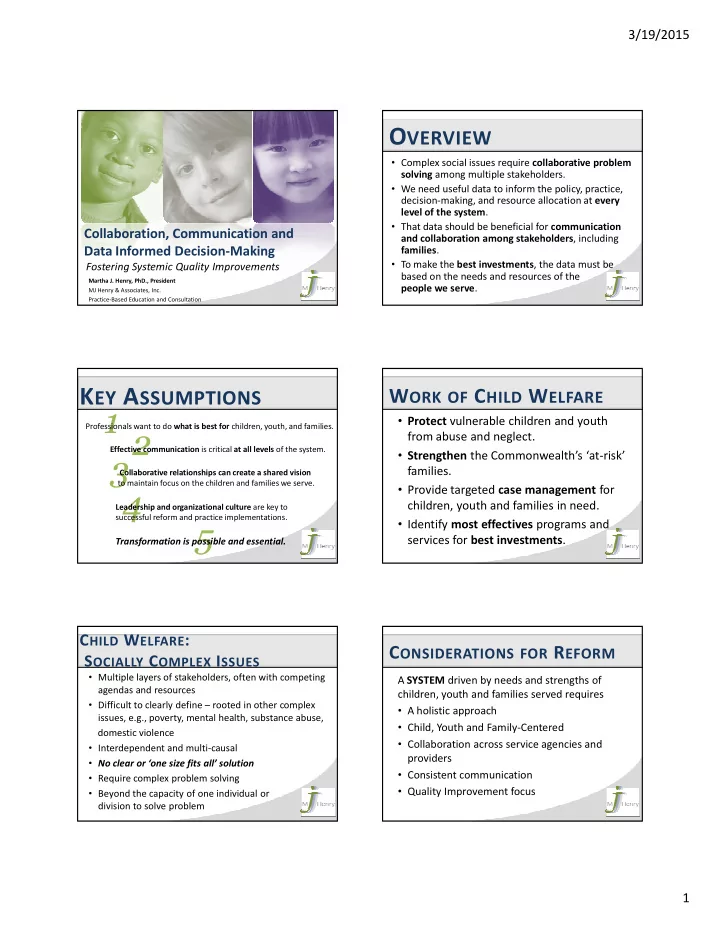

3/19/2015 O VERVIEW • Complex social issues require collaborative problem solving among multiple stakeholders. • We need useful data to inform the policy, practice, decision-making, and resource allocation at every level of the system . • That data should be beneficial for communication Collaboration, Communication and and collaboration among stakeholders , including Data Informed Decision-Making families . • To make the best investments , the data must be Fostering Systemic Quality Improvements based on the needs and resources of the Martha J. Henry, PhD., President people we serve . MJ Henry & Associates, Inc. Practice-Based Education and Consultation K EY A SSUMPTIONS W ORK OF C HILD W ELFARE � • Protect vulnerable children and youth Professionals want to do what is best for children, youth, and families. � from abuse and neglect. Effective communication is critical at all levels of the system. � • Strengthen the Commonwealth’s ‘at-risk’ families. Collaborative relationships can create a shared vision to maintain focus on the children and families we serve. � • Provide targeted case management for children, youth and families in need. Leadership and organizational culture are key to successful reform and practice implementations. � • Identify most effectives programs and services for best investments . Transformation is possible and essential. C HILD W ELFARE : C ONSIDERATIONS FOR R EFORM S OCIALLY C OMPLEX I SSUES • Multiple layers of stakeholders, often with competing A SYSTEM driven by needs and strengths of agendas and resources children, youth and families served requires • Difficult to clearly define – rooted in other complex • A holistic approach issues, e.g., poverty, mental health, substance abuse, • Child, Youth and Family-Centered domestic violence • Collaboration across service agencies and • Interdependent and multi-causal providers • No clear or ‘one size fits all’ solution • Consistent communication • Require complex problem solving • Quality Improvement focus • Beyond the capacity of one individual or division to solve problem 1
3/19/2015 D ATA -I NFORMED D ECISION M AKING • Having a common metric to understand the needs and strengths of our families. • Using that information to inform policy, practice and improvements activities. – Collaborate with stakeholders – Diversion practice – High-risk screening – Service planning and monitoring • What works and for whom? – Family resource and skill development needs – Professional development needs C OMMUNIMETRICS T RANSFORMING LIVES AND SYSTEMS • A framework based on the assumption that A required focus of a shared vision of the children and families communication can create a shared meaning receiving services and can be an instrument for consensus building For effective services within complex systems the following are a and planning. MUST: • Communimetrics framework is action-oriented 1. Collaboration of multiple partners often with different mandates, and focused on both the planning process and agendas, priorities, and perspectives outcomes (Lyons, 2009). 2. Communication facilitation among all partners, including youth and • A family of evidence-based functional assessment families tools: 3. Shared commitment to serving children and families despite differences – CANS* – Individual Youth 4. Collective accountability to the child and family – FAST – Family – ANSA – Adult *versions in current use in Massachusetts state contracted mental health services T RANSFORMATIONAL C OLLABORATIVE S HARED V ISION O UTCOMES M ANAGEMENT • Transformational: It is embedded in all activities with families A collaborative relationship as full partners with a focus on positive transformations of their health, well-being, and functioning. between stakeholders to develop a • Collaborative: Stakeholders are invested in making quality shared understanding of identified improvements and have consistent data to communicate about the people served across multiple levels of the system. problems and its sources, assets, a • Outcomes: The measures are relevant to decisions about shared goal and a set of actions to approach or proposed impact of interventions. achieve that goal. • Management: Information is used to collaboratively improve the quality of the various levels of the system. 2
3/19/2015 Collaborating Family and Youth for Success TCOM APPROACH LEADS TO Program System Data-informed Decision Making • Identification of at-risk children, youth and Decision Support families. Youth & Families Collaborative Matching Resources to Determine Assessment and Needs and Strengths • Collaboration and communication across Resources Needed Treatment Planning multiple agencies. Outcome Monitoring • Data-informed decision-making Treatment (Strengths Practice Knowledge and Needs) Review Benchmarking and Consolidation and – Decision Support Collaborative and Transition Transfer Optimal Treatment Identification Improvement Planning and Implementation – Outcomes Monitoring Quality Improvement – Quality Improvement Strengths-Based Program-Level Clinical Learning, Supervision and Formulation and Empowering Resourcing Intervention • Expansion of best practices and System Multi-Level Implementation of elimination of ineffective practices. Success Discovery and Practice Transfer M AKE Family & Family & AKE IT IT HARD HARD FOR FOR Individual Individual Functional Resources Needs PEOPLE TO PEOPLE TO DO DO THE THE Communication WRONG THING WRONG THING AND AND EASY EASY & Collaboration FOR FOR PEOPLE PEOPLE TO TO DO DO THE THE Information Integration for Critical Activities THING . . RIGHT RIGHT THING Decision-Support Progress Monitoring Quality Improvements C ONTACT MJ Henry & ASSOCIATES, INC . Martha J. Henry, PhD., President Email: martha.henryphd@comcast.net Phone: (508) 641-1647 Website : www.mjhenryandassociates.com 3
Recommend
More recommend